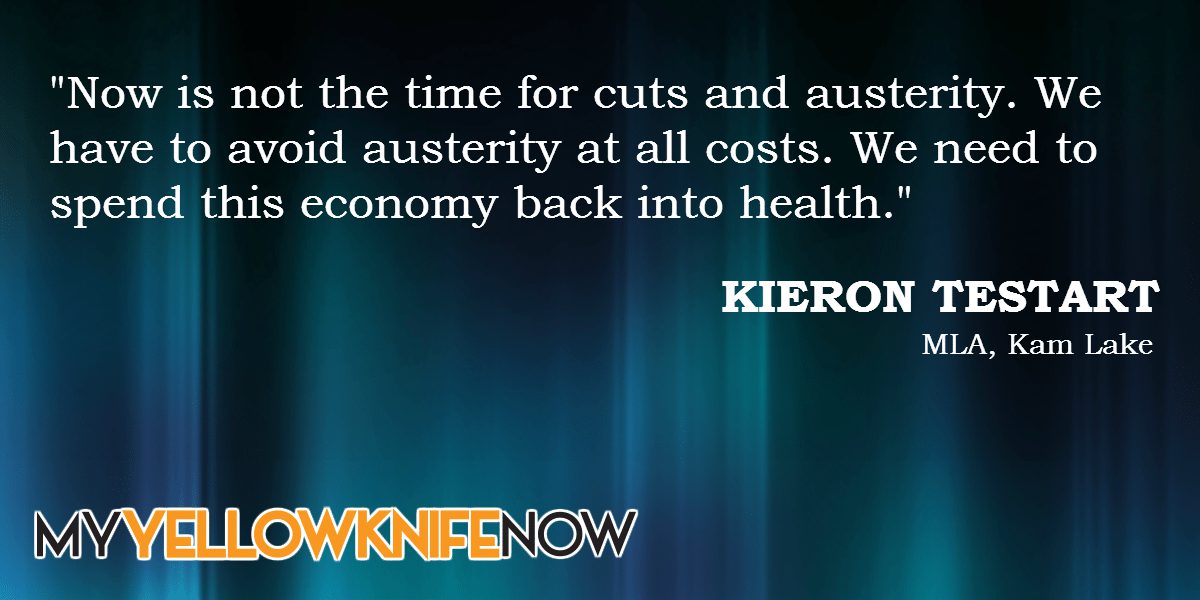Territorial politicians have been invited to consider tax hikes worth $250 million per year as they look at ways to rescue the Northwest Territories economy.
MLAs say tax changes are one of many options.
Job cuts at the territorial government are another possibility, though that will be fiercely opposed by the Union of Northern Workers as collective bargaining continues.
David Thompson and Diana Gibson, of research firm PolicyLink, spent an hour on Wednesday outlining tax options available to the NWT in a meeting with MLAs.
The researchers – hired by left-wing social justice body Alternatives North – urged politicians to reject cuts, presenting a range of tax initiatives they claim could earn the territory tens of millions of dollars.
In full: PolicyLink’s presentation on NWT tax options (ppt)
Those include raising personal income tax to meet the mean across Canada; upping corporate tax; introducing more forms of sales tax; taxing tourists on travel and accommodation; increasing tax on tobacco and liquor; and creating a carbon tax.
“The revenues we’ve described above have the potential to raise upwards of $250 million a year,” Thompson told MLAs.
“We’re not suggesting you try to raise all those funds – just pointing out a suite of options and saying you have an alternative to cuts here.”

Any tax increases would come in a stagnant economic environment where many NWT families are already struggling to meet the northern cost of living.
However, Kam Lake MLA Kieron Testart told Moose FM taxation “has to be a factor” in any discussion of how the territory props up its finances.
“Now is not the time for cuts and austerity. We have to avoid austerity at all costs. We need to spend this economy back into health and start getting mineral exploration back on the table,” said Testart.
“We do need to be thinking about how our system operates. But the most important thing is ensuring that our cost of living is kept down and we do nothing to increase it. We are in a very difficult position with people leaving the NWT and we cannot add additional costs on hardworking northerners who want to be here.
“I will not support anything that goes toward that angle, so taxation has to be carefully balanced with who it’s going to affect and how it affects the bottom line of northerners. But make no mistake, we are in tough and challenging economic circumstances and we have an obligation to explore all options.”
Last fall, then-MLA for Yellowknife Centre Robert Hawkins raised the possibility of government job cuts in 2016 as resource revenues falter. A surprise $34 million cut in federal transfer payments has also dented the NWT’s financial security.
Read: Feds say ‘best people’ working on territorial funding crisis
“I’m not a big fan of cutting positions,” said Nahendeh MLA Shane Thompson.
“I honestly believe that positions should be the last resort. We should be creative in this government – we need to be creative.
“I’m not a big fan of taxes, either,” he conceded.
Cory Vanthuyne, the MLA for Yellowknife North, said ‘efficiencies’ had to be found.
“You have programs and services that have evolved over time – some are 10, 15 years old. They were created with all good intentions at the time but they have never been looked at again,” he told fellow politicians.
“They’re sitting on a shelf but also being funded every year. Are they still practical? Do they need tweaking or do they, in fact, need to be removed?
“The government should take the time and do reviews to assess the efficiencies of our programs and services.”
PolicyLink’s researchers said there was “a lot of room” for the NWT to change its tax system, presenting a series of charts to suggest the territory can increase tax “to meet the other provinces and territories”.
“It’s happening all over the place. ‘No new taxes’ is a thing of the past,” said Thompson.
“It’s happening elsewhere. It doesn’t raise eyebrows any more.”




